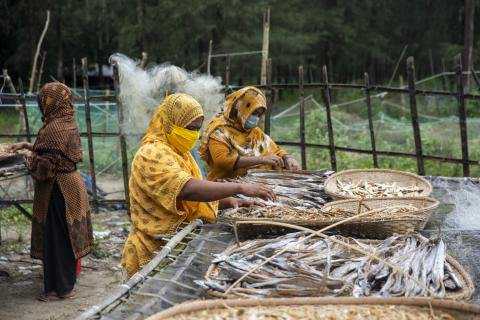IOM launches livelihoods task for returning migrants and host communities found in Cox’s Bazar

Image: Collected
The COVID-19 pandemic has hit Bangladesh harder than any tropical cyclone. Instead of uprooting trees and hurling powerful tides from an angry sea, what’s been uprooted will be entire livelihoods-as very well as the families hoping to survive in another of the world’s most crowded countries.
Returning migrants and host communities in the southernmost district of Bangladesh happen to be feeling the worst of the onslaught. There, some 700,000 people have lost their income source, just since the mid-March 2020 COVID-19 outbreak. Almost twelve months later, virtually all have limited usage of jobs. Women are not as likely than men to safe and sound any job at all.
Increasing the struggle for jobs are the many migrants pressured house as jobs are dropped overseas. Based on the Ministry of Expatriates’ Welfare and Abroad Employment, over 400,000 migrant personnel have returned to Bangladesh since March 2020. The ripple effect isn't only heightened competition for do the job, but as well a collapse of a local economy because of inability to repay loans-including cash borrowed to go abroad for work.
The International Organization for Migration (IOM) on Wednesday (24/02) launched a 24-month project called “Building Social Cohesion in Host Communities in Cox's Bazar through Expertise Development.” It really is for returning migrants and vulnerable host communities to use the troubled time to do something crucial, though it may certainly not pay back for years. That is, to acquire the abilities needed to territory and keep a job in the future.
“We are focused on working with our partners to build the resilience of returning migrants and foster cultural cohesion among their communities of return,” explained Patrick Charignon, IOM Cox’s Bazar Transition and Recovery Program Coordinator. “We think that through this project we can offer unemployed community participants the skills had a need to build better futures for themselves, their families and their communities.”
The principal driver of migration from Cox’s Bazar district is the lack of employment opportunities. Sadly, the existing pandemic is further threatening the welfare of millions of men and women in the united states, where there were large-scale redundancies of employees, specifically in the garment sector. Right now, there is certainly wide-spread food insecurity.
According to the Bangladesh Bureau of Figures, Cox’s Bazar is one of the lowest-executing districts in Bangladesh regarding education and skills training, with about 33 % of the populace living underneath the poverty line.
Through the project, over 200 community members will receive skill development and livelihoods support. To ensure the sustainability of the initiative, the project will encourage the trained beneficiaries to carry out their own workout sessions for other community participants. This “train the trainers” methodology means the beneficiaries will well exceed the relatively few persons attending the first training sessions.
This will be achieved through the profiling of skills of selected unemployed community members and returning migrant workers, and the implementation of a series of targeted livelihood diversification training modules predicated on the findings of the abilities profile assessment.
The training modules themselves will be chosen following an assessment, and will depend on the capabilities and interests of the participants. Previous modules below have covered topics such as for example construction, dry angling and tailoring-abilities that in better circumstances quickly result in local jobs.
While targeted monetary stimulus packages are getting discussed for the most vulnerable, IOM has undertaken this new project because of its belief that it's critical to build the resilience of web host communities in Cox’s Bazar through expertise development. The initiative aims to ease unemployment by equipping beneficiaries with the know-how to build up the skills needed to meet the employment demands of the labour industry, as well as buying self-employment opportunities.
The project will be implemented in close partnership with the Deputy Commissioner’s Workplace in Cox’s Bazar, the Department of Open public Health insurance and Engineering, civil society organizations, host communities and key stakeholders.
“IOM has already been implementing several projects helping host communities in Cox’s Bazar,” said Cox’s Bazar’s Deputy Commissioner Md Mamunur Rashid, addressing due to chief guest through the project start. “We applaud this fresh initiative and warranty the continuing support of the District Administration, Upazila and Union for the good implementation of the project.”
The project has been funded with USD 300,000 beneath the IOM Development Fund.
Source: https://reliefweb.int
Tags :
Previous Story
- Bangladesh’s coastal communities deserve advantages from the blue...
- Bad to worse: Looming locust attack amid coronavirus...
- Tourism, hospitality haemorrhaging money, employees
- CPA may waive dues of LNG terminals, carriers
- Chadpur’s Balu Char Can be the Next Cox’s...
- Clarks Inn Group keen to help develop hospitality...
- India-Bangladesh To Start Cruise Tourism Via Picturesque Sunderbans